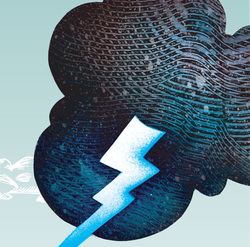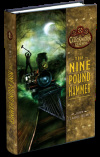 As exciting as a 4 AM phone call from the Nobel Prize committee! "The Theory of Everything" is among the chosen few - it's one of seven 2012 Cybil Awards finalist in young adult fiction. So, so delighted and humbled to share the honor with such great authors. I've got my reading list! "Johnson deftly blends humor and grief in this story of a teenager’s struggles to make sense of her best friend's death. The witty chapter drawings (designed by Johnson) and main character Sarah’s pitch-perfect voice make The Theory of Everything compulsively readable, but the underlying veins of emotions—confusion, grief and even hope—keep this from feeling like lighter fare. Teens will understand Sarah’s desire to keep the world at bay with her “snarkbox,” but it’s the moments when Sarah puts aside the snark to truly face life that will leave a lasting impression. With a cast of characters that includes a tame possum, a wonder dog, and a maybe-creepy-maybe-misunderstood Christmas tree farmer, The Theory of Everything keeps readers guessing—and laughing—and crying—to the last page." When my first novel, This Girl is Different, came out last year, I avoided reading reviews. Avoided like the plague. The very thought of their existence filled me with Walking Dead dread.
My publicists, editor, and agent are very careful not to send me reviews, per my request; reviews get sent to my manager (aka my husband) who reads them, but keeps their contents in the vault. He tells me excerpts for my website and Facebook and stuff. You’re probably all, “Time out! I call WUSS! Authors need thick skin. You gotta listen to criticism. Otherwise you won’t grow as a writer.” Yes. Agreed. I am a wuss. And agreed: critique is paramountally important.* [Yes, I just wrote paramountally. Whatevs. I’m writing this in the thick of a bunch of 7 and 8 year olds constructing scrap-material cars, and they’re all screaming and running around, and I forgot my earbuds. ARGH.] Anyhoo. Where was I. Right. Critique. Critique is one of the top three necessities of successful authors -- the other two necessary components being (1) writing, and (2) reading a ton. I am open to critique, but here’s the thing: source matters. I am wide open to critique FROM PEOPLE I TRUST. Are most professional reviewers smart, thoughtful readers who care about books and their place in literature and libraries? Almost certainly. But what about the few bad apples? What if my reviewer is a Bitter Betty who gave up on her own novels (or never even got started) and is now on a mission to spread misery wherever she goes? That’s not a review I need to invite into my psyche. So now you’re all, “Why not just read the good reviews?” Well, because. If I take to heart the good reviews from people I don’t know, it’s only fair I take the bad. I suppose I could do like the Olympics, and discard the top and bottom scores, but that’s getting a bit complicated. Besides, I’d have to read them all to keep track. So. Here’s what I do: I listen to people I trust. My critique group (Stephen Messer, Jennifer Harrod, John Claude Bemis – Adverb Fight Club, holla!) are my first readers, and we meet and drink coffee or beer and they tear my work to shreds. Shreds. AND THEN THEY HELP ME BUILD IT BACK UP into something better. Because they are my friends, and they are super smart, and they are working on their own books, and THEY HAVE MY BEST INTEREST AT HEART. They have my back; I have theirs. End of story. Well, actually start of story .... After Adverb Fight Club does their worst/best, I rewrite. And then hand it to my husband to read and critique, and I fix more stuff. Then it goes to my agent, who is super thoughtful, professional, and honest; based on her feedback, I make more changes. If you’re keeping track, that’s at least five critics – and probably twenty re-writes – before a manuscript hits the desk of my editor at Peachtree, Kathy Landwehr. Who then rips it to shreds … again. And so I rewrite it again. And I give it back to my critique group. And then my husband. And then back to Kathy. (Ginger gets spared that round.) Then it goes to my parents and mother-in-law, and Peachtree’s several copy editors. THEN it goes to print. So. Yeah. I can take criticism. But I don’t read reviews. Except when I do read reviews. I’ve read a few more of them with the publication of my second novel, The Theory of Everything. And I’ll be honest, I was stoked to get a starred review from Publisher’s Weekly. Because it was complimentary, yes, but mostly because maybe the little red star in front of my book gets it on more school and public library shelves, and into the hands of more readers. *Thick skin is not necessary; persistence is. But that’s another blog post for another time.  Let me be clear: as an author, I care a lot about copyright and piracy. But I care a lot more about freedom. SOPA and PIPA would let the US government --and the big corporations most of our representatives are clearly beholden to-- mess with internet content AND structure. I'm convinced that SOPA and PIPA will break the internet -- technically, practically, and philosophically. If you want to learn more, the video is a great primer. But don't take it from me. Do your own research. And when you do, please contact your representatives. Stat. (Click the link at left to contact your reps, but remember, when it comes to actions like this, phone calls count a LOT more than e-mails.)  _T-MINUS three days before Christmas. Once again, Charlie Brown has kicked us in the gut with his wimpy-sad tree, reminding us that the season isn't supposed to be about consumerism. And yet. And yet the hubs and I are counting the rechargeable batteries we need to stockpile, since Santa's official policy is "batteries not included." (Oy. Santa. That's a whole 'nother post.) Got me thinking, as it always does, about consumerism. I wrote this article for Friends Journal, "On Potty Training and Consumerism," and thought I'd share some of it here. My article (apparently from a time in my life when I was much wiser) concludes thusly: "... Ultimately, consumption doesn’t only mean buying things; it connotes an illness of taking in more than we put out. Consumption, to me, includes watching too much TV, eating non-nutritive foods, being too lazy to hang the clothes outside to dry, reading celebrity magazines, gossiping, driving a gas-guzzler. Consumption is that which distracts me from the real work—and joy—of life: connection, creation. The opposite of consumption is creation: giving, generating, being generous. Connecting to myself and others. Examples? Hiking, yoga, writing, sharing wholesome dinners, playing with my family, spending time with friends, making gifts, attending Meeting for Worship, gardening, voting, camping, being intimate, caring for the Earth, reading good books, praying. My goal has become to put out a bit more than I take in, on a daily basis. It’s the days when I give Sam my full attention, when I eat well, when I garden, when I really listen to my husband, when I walk in the woods, when I write a new chapter of my novel—when I then fall into bed exhausted, with a content heart. That, to me, is the opposite of consumerism. That is valuing creation more than consumption. And that’s what I want to teach [my son]." What do you think? Leave a comment; I'd love to hear from you. CLICK THE 'READ MORE' LINK TO READ MY "ON POTTY TRAINING AND CONSUMERISM" ARTICLE --->  From the TEEN WRITERS BLOC - blog and book reviews from MFA students at the New School read the whole review here: http://www.teenwritersbloc.com/2011/06/02/book-review-girl-j-j-johnson/ Excerpt: "... Author J.J. Johnson could have taken us in the standard direction with this—mean girls torment our heroine until the handsome jock comes to her rescue. Thankfully, Johnson’s Evie and the world she lives in are much more unique and nuanced. Johnson spreads a message throughout the book about the value of activism and standing by your principles, but it rarely comes across as preachy. Instead, Evie and the other characters, who include a boy, a cheerleader who’s more than pom-poms, and a creepy teacher too many teens will recognize, are well rounded individuals with real-world concerns. "One of the great things about this book was that it caused me to think about things I don’t normally think about. Evie, in genuine confusion, wonders why she’s not allowed to use her cell phone or go outside during lunch. I have no doubt that these are real restrictions that kids face, and they had me scratching my head, too. (My high school had an open campus, so even hall passes seem weird to me. I’m not sure how I would have reacted to suddenly being locked inside.) ..." (Posted on TEEN WRITERS BLOC by Mary G. Thompson, June - 2 - 2011)  _This "authorthoughts" interview by thatcovergirl.com isn't exactly new; I'm re-posting due to popular (or perhaps polite) demand. JJ: I really didn’t have a sense of what the cover might look like, and I didn’t give any concept input to Peachtree. The only thing I knew for certain was that I did NOT want what I call a “headless girl body” cover: those YA covers with a photo of a skinny teenager, wearing trendy clothes, whose head is either cropped out of the picture or hidden behind some object. I assume those covers are trying to encourage readers to picture themselves as the heroine (“insert your face here”), but I think they’re very objectifying. Our culture already tells girls to think their bodies and clothes are the most significant part of their identity, and “headless girl body” covers reinforce that idea. What does it say when the heroine of a novel doesn’t have a head worth including on the cover? It’s a subtle message, but it’s unhealthy. Readers need to see whole people, with strong minds and smart brains attached to their healthy bodies.... read the full interview: http://thatcovergirl.com/2011/03/17/authorthoughts-jj-johnson-this-girl-is-different/ OR CLICK OVER THERE TO READ MORE ---->  _ Writing novels is a team sport. I am super lucky to be part of a critique group with three fantastic writers: John Claude Bemis, Jennifer Harrod, and Stephen Messer. We have a great respect and love for each other, and we agree on just about everything, except plot points, spoilers, use of -ly adverbs, characterization, book recommendations, or a name for our group. Anyhoo... did I mention how close we are? We've been meeting regularly since before any of us were published. Now, six years later, our group has more than 9 books published or under contract. But don't take my word for it. Get the scoop from John on Smack Dab in the Middle.  _Excerpt: What initially inspired this story? Obama was campaigning and I was thinking about change and the system, and speaking your mind and free speech. I was thinking, 'What if you grew up outside the system? What if you viewed high school through different eyes?' And I wanted to look at how free speech can cross the line into bullying, because Evie, our heroine, is very much about free speech and all her rights, but that part of her revolution gets out of control, not in her hands, but in other people’s hands. It’s about the responsibility that comes with free speech, both to your community and to yourself... See the complete interview here. |